The Best 10 Alternatives to Foxpass (+ Pricing & Reviews)
Twingate Team
•
Jul 27, 2024

Foxpass provides cloud-based authentication services, including Cloud RADIUS and Cloud LDAP servers, designed to enhance security for IT and engineering teams. While Foxpass offers robust solutions, it may not be suitable for every organization. This article explores the benefits and limitations of using Foxpass for secure access management.
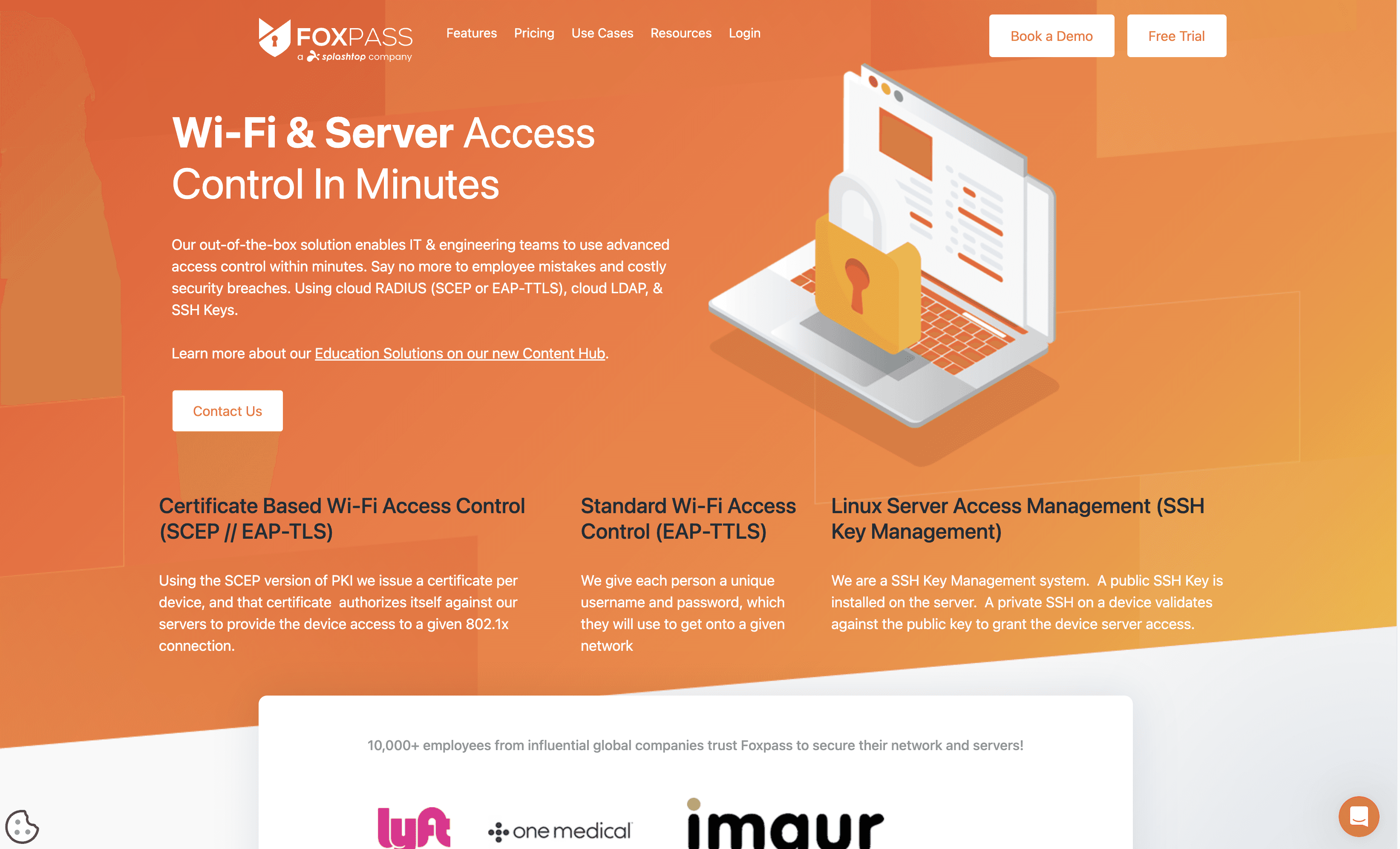
10 Alternatives to Foxpass
1. ManageEngine PAM360
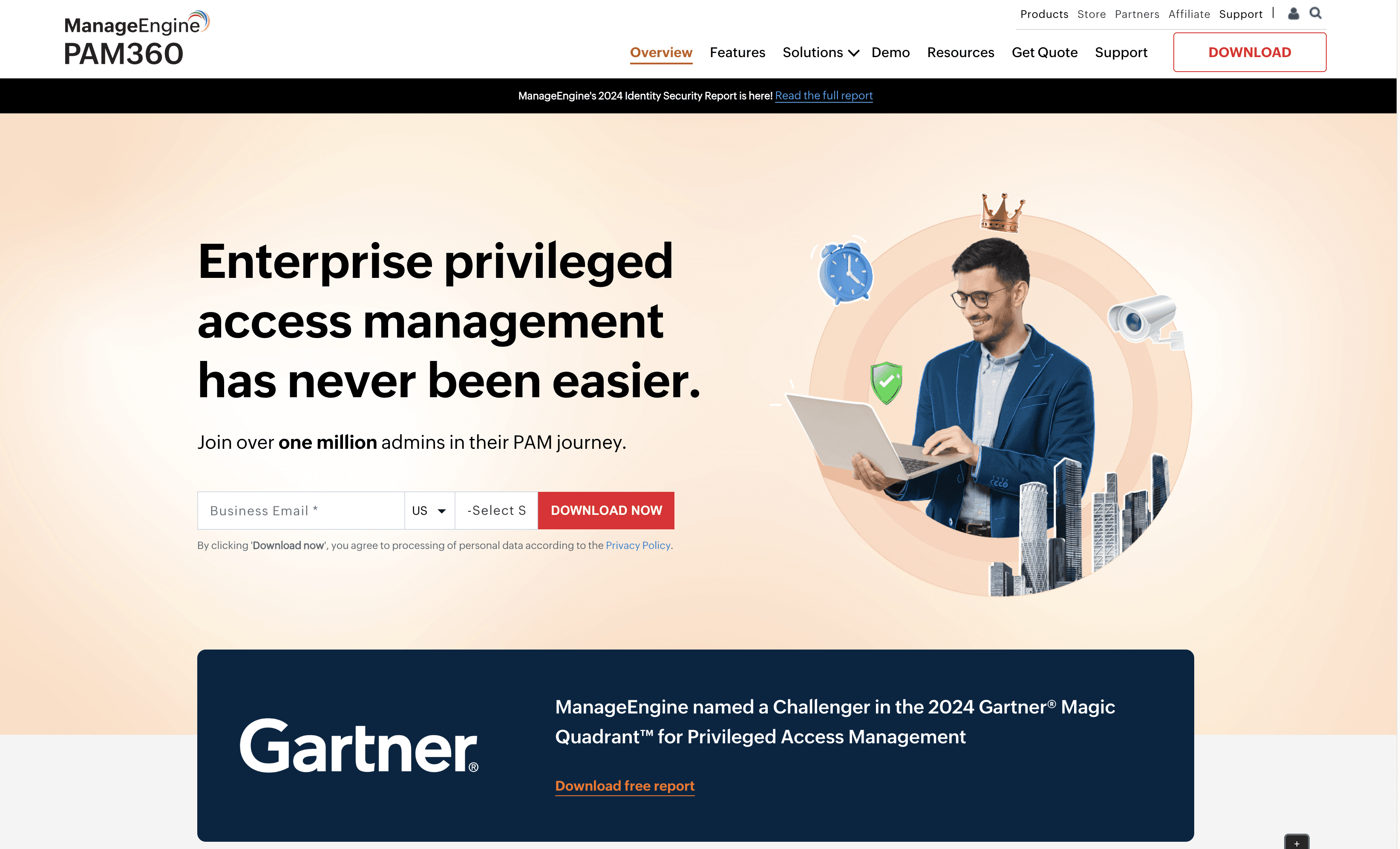
ManageEngine PAM360 is a comprehensive Privileged Access Management solution designed to help enterprises manage and secure privileged accounts. It offers features like session management, privilege elevation, and user behavior analytics, making it a robust tool for enhancing security and compliance in IT environments.
ManageEngine PAM360 Pricing
ManageEngine PAM360's pricing is not public. Contact their support for more info.
ManageEngine PAM360 Reviews
ManageEngine PAM360 has an overall rating of 4.5 out of 5 stars based on 1 review. Users praise its easy integration and management. Check out more of our reviews here!
Pros and Cons of ManageEngine PAM360
Pros:
Comprehensive Feature Set: ManageEngine PAM360 offers a wide range of features, including credential vaulting, privileged account governance, and remote access management.
Integration Ecosystem: Seamlessly integrates with other ManageEngine tools, enhancing overall IT management and security.
User-Friendly Interface: The console's intuitive UI simplifies management and deployment, making it accessible even for less tech-savvy users.
Cons:
Complexity for Small Businesses: The extensive feature set may be overwhelming for smaller organizations with simpler needs.
Learning Curve: Despite its user-friendly interface, the broad functionalities require a learning period for new users.
Cost: Advanced features and compliance readiness might come at a higher cost, which could be a concern for budget-conscious organizations.
2. Delinea
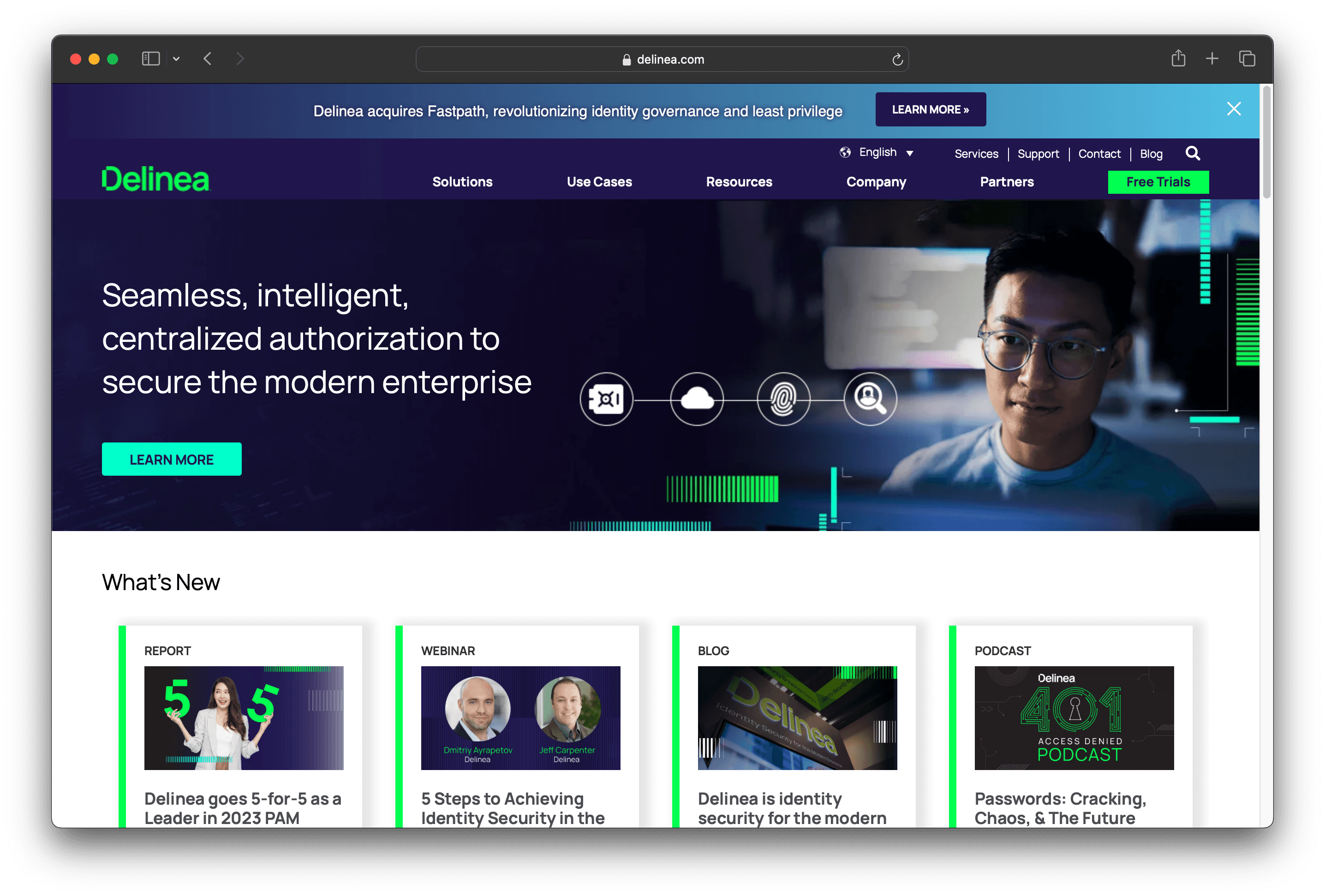
Delinea offers Privileged Access Management and Identity Security solutions designed to secure identities at every interaction. With features like secure credentials, privileged remote access, and real-time threat response, Delinea aims to enhance security and productivity for organizations of all sizes, ensuring ease of deployment and management.
Delinea Pricing
Delinea's pricing is not public. Contact their support for more info.
Delinea Reviews
Delinea has an overall rating of 4.3 out of 5 stars based on 40 reviews. Users appreciate its ease of use and flexibility. Check out more of our reviews here!
Pros and Cons ofDelinea
Pros:
Ease of Use: Users find Delinea intuitive, reducing the learning curve and making it accessible for teams with varying technical expertise.
Customer Support: Highly rated for responsive and effective support, ensuring issues are resolved promptly and efficiently.
Integration Capabilities: Seamlessly integrates with various systems, enhancing overall IT infrastructure without causing disruptions.
Cons:
Cost: The comprehensive features and high reliability come at a premium, which may be prohibitive for smaller organizations.
Navigation Issues: Some users report difficulties with the software's navigation, which can hinder efficiency.
Software Bugs: Occasional bugs have been noted, requiring attention and potentially impacting user experience.
3. Krontech Single Connect
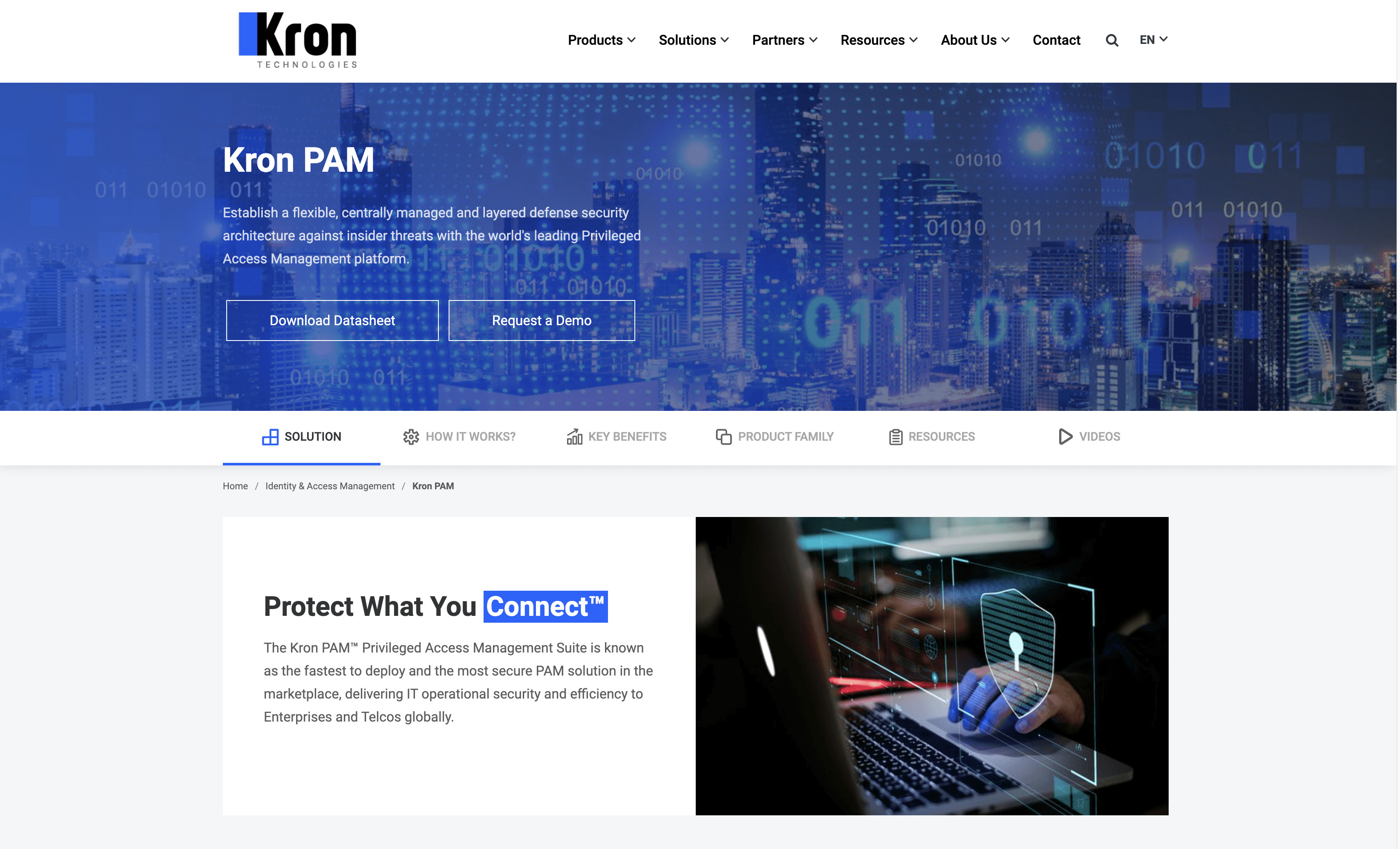
Krontech Single Connect is a Privileged Access Management solution designed to secure privileged accounts, control configurations, and record all activities in data centers or network infrastructures. It aims to prevent breaches, maintain accountability, and increase operational efficiency, making it suitable for enterprises and telecom companies globally.
Krontech Single Connect Pricing
Krontech Single Connect's pricing is not public. Contact their support for more info.
Krontech Single Connect Reviews
Krontech Single Connect has an overall rating of 4.5 out of 5 stars based on 1 review. Users say it is a "must-have for every organization." Check out more of our reviews here!
Pros and Cons of Krontech Single Connect
Pros:
Fast Deployment: Krontech Single Connect is known for its rapid deployment, making it one of the quickest PAM solutions to implement.
High Security: Provides comprehensive security for IT operations and privileged accounts, ensuring robust protection against unauthorized access.
Unified Management: Efficiently manages access, control configurations, and activity recording, streamlining administrative tasks.
Cons:
Complexity: Implementing and managing this comprehensive PAM solution can be complex, requiring specialized knowledge and training.
Cost: High-end security solutions like Krontech Single Connect can be expensive, potentially limiting accessibility for smaller organizations.
Integration: Integrating with existing systems and workflows might pose challenges, necessitating significant effort and resources.
4. Teleport
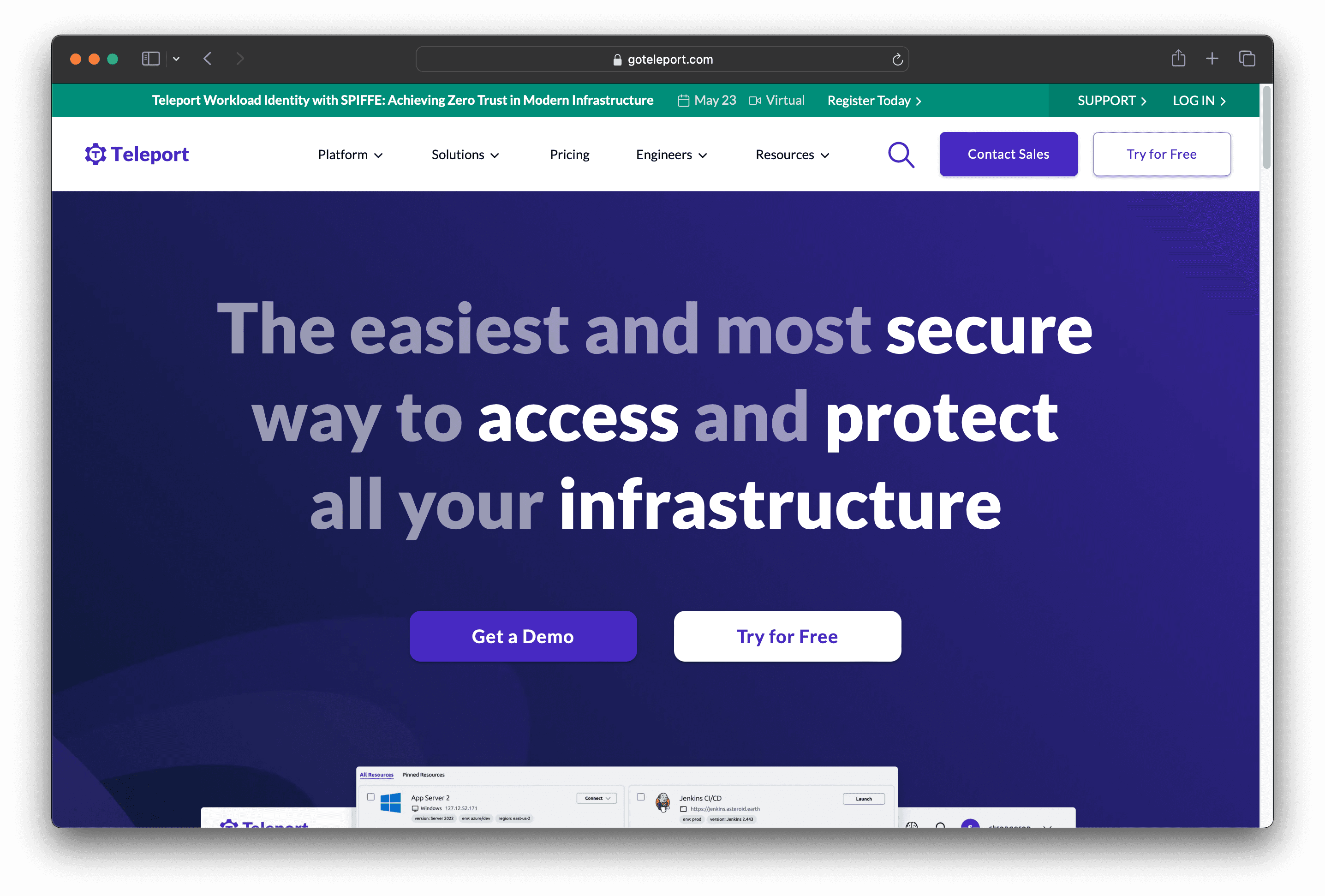
Teleport is a secure access solution designed to simplify infrastructure management. It offers zero trust access, secretless authentication, and unified policy governance, making it easy for teams to protect and manage their systems. Teleport aims to enhance security and efficiency for organizations of all sizes.
Teleport Pricing
Teleport's pricing is not public. Contact their support for more info.
Teleport Reviews
Teleport has an overall rating of 4.5 out of 5 stars based on 104 reviews. Users appreciate its ease of use and secure access. Check out more of our reviews here!
Pros and Cons of Teleport
Pros:
Secure Access: Teleport provides the most secure way to access and protect infrastructure, ensuring robust security for all users and devices.
Zero Trust Access: Implements zero trust principles, offering secure remote access to applications and workloads without relying on traditional VPNs.
Unified Experience: Breaks access silos by unifying user and machine access to all services, applications, and workloads, simplifying management.
Cons:
Complexity for New Users: The platform may have a learning curve, especially for junior engineers who are not very SSH savvy.
Dependence on Identity Providers: The security and functionality heavily rely on integration with identity providers, which could be a single point of failure if compromised.
Regulatory Hurdles: While Teleport helps meet compliance, navigating these regulatory requirements can still be complex and resource-intensive for organizations.
5. Okta ASA
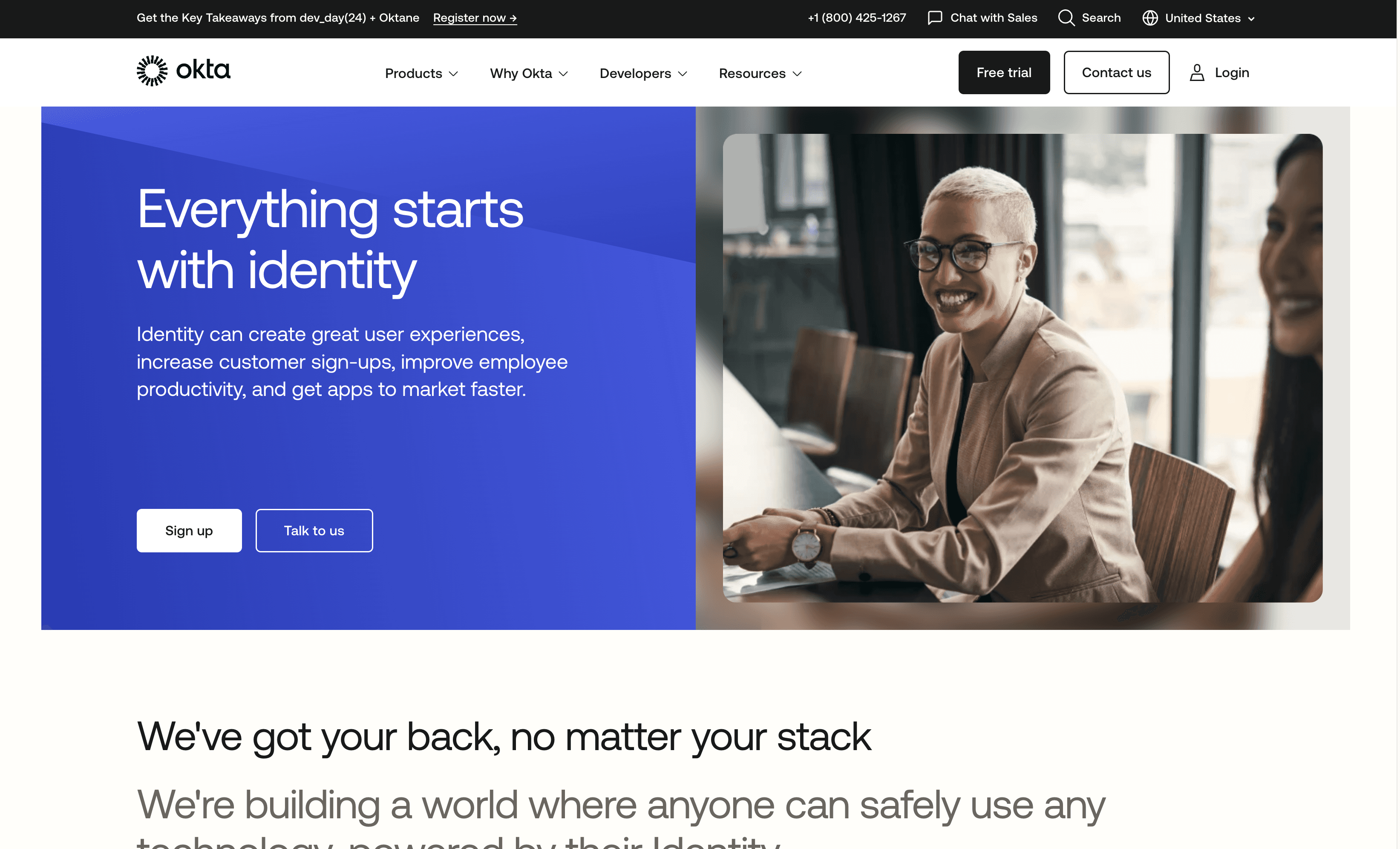
Okta ASA is a secure access solution designed to simplify infrastructure management. It offers zero trust access, secretless authentication, and unified policy governance, making it easy for teams to protect and manage their systems. Okta ASA aims to enhance security and efficiency for organizations of all sizes.
Okta ASA Pricing
Okta ASA's pricing is not public. Contact their support for more info.
Okta ASA Reviews
Okta ASA has an overall rating of 4.6 out of 5 stars based on 1,200 reviews. Users praise its robust identity management and ease of use. Check out more of our reviews here!
Pros and Cons of Okta ASA
Pros:
Rock-Solid Security: Okta ASA ensures robust security measures, protecting sensitive data and access points effectively.
Streamlined User Experiences: Enhances user experiences, increasing customer sign-ups and satisfaction through seamless access management.
Improved Workforce Productivity: Boosts workforce productivity by simplifying access to necessary tools and applications.
Cons:
Complex Setup: Initial setup and configuration can be complex, requiring specialized knowledge and time.
Cost: The comprehensive features come at a premium, which may be prohibitive for smaller organizations.
Integration Challenges: Integrating Okta ASA with existing systems can pose challenges, necessitating significant effort and resources.
6. Sailpoint
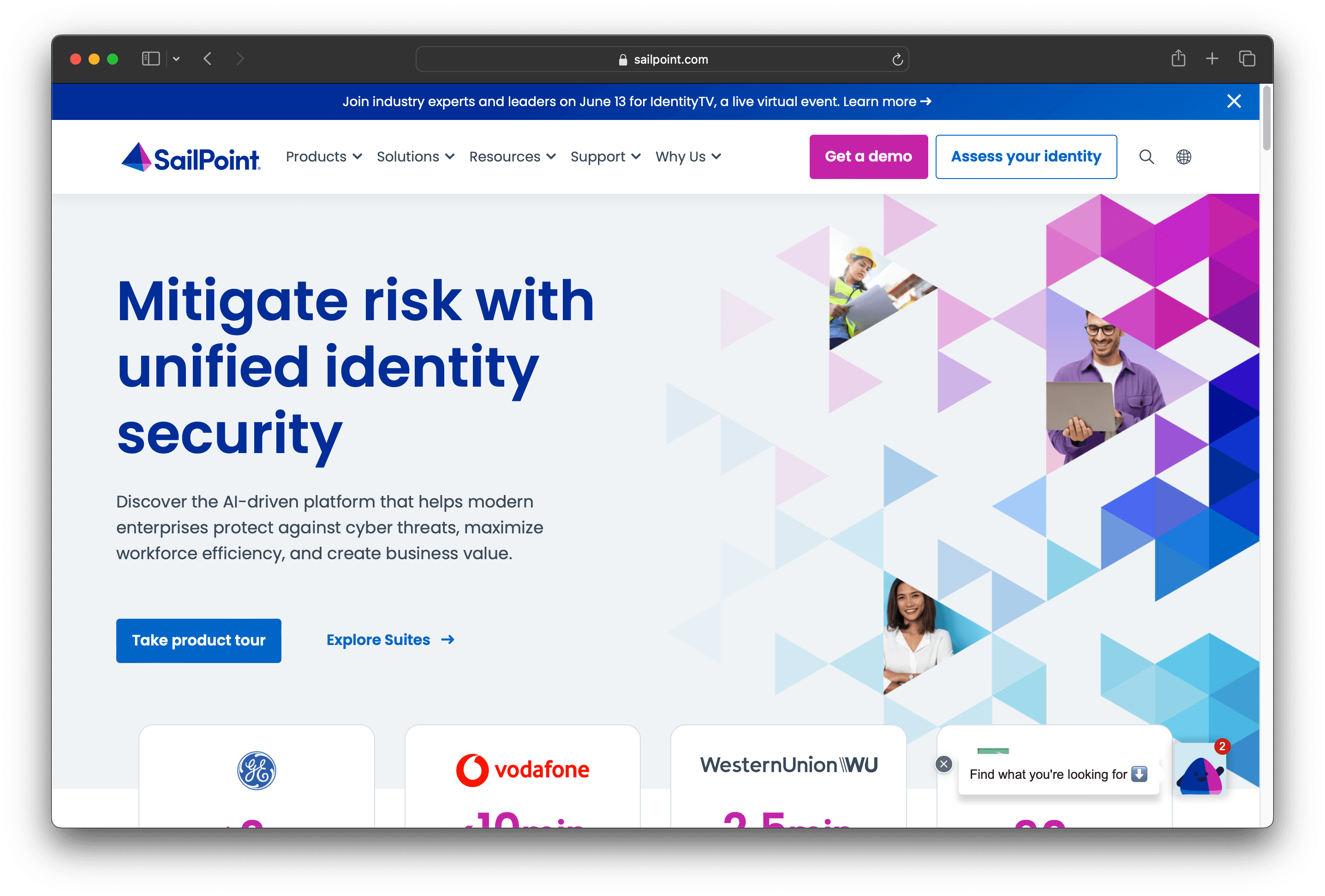
SailPoint is an identity security solution designed to meet the demands of modern enterprises. It offers intelligent, autonomous, and extensible identity management, ensuring secure and efficient operations. SailPoint aims to streamline identity processes, providing a robust foundation for managing and securing all identities and access points.
Sailpoint Pricing
SailPoint's pricing is not public. Contact their support for more info.
Sailpoint Reviews
SailPoint has an overall rating of 4.4 out of 5 stars based on 76 reviews. Users appreciate the automation of access reviews and policy enforcement. Check out more of our reviews here!
Pros and Cons of Sailpoint
Pros:
Intelligent Insights: SailPoint leverages AI and machine learning to provide real-time insights, enhancing identity and access management efficiency.
Autonomous Identity Management: Streamlines identity processes, reducing manual intervention and driving organizational efficiency.
Extensible Integration: Seamlessly integrates with various systems, centralizing access control across the entire IT ecosystem.
Cons:
Complexity: Implementing and managing SailPoint can be complex, requiring significant resources and expertise.
Cost: The advanced features and capabilities come at a premium, potentially limiting accessibility for smaller organizations.
Integration Challenges: Integrating SailPoint with existing systems may pose challenges, necessitating considerable effort and resources.
7. Arcon PAM
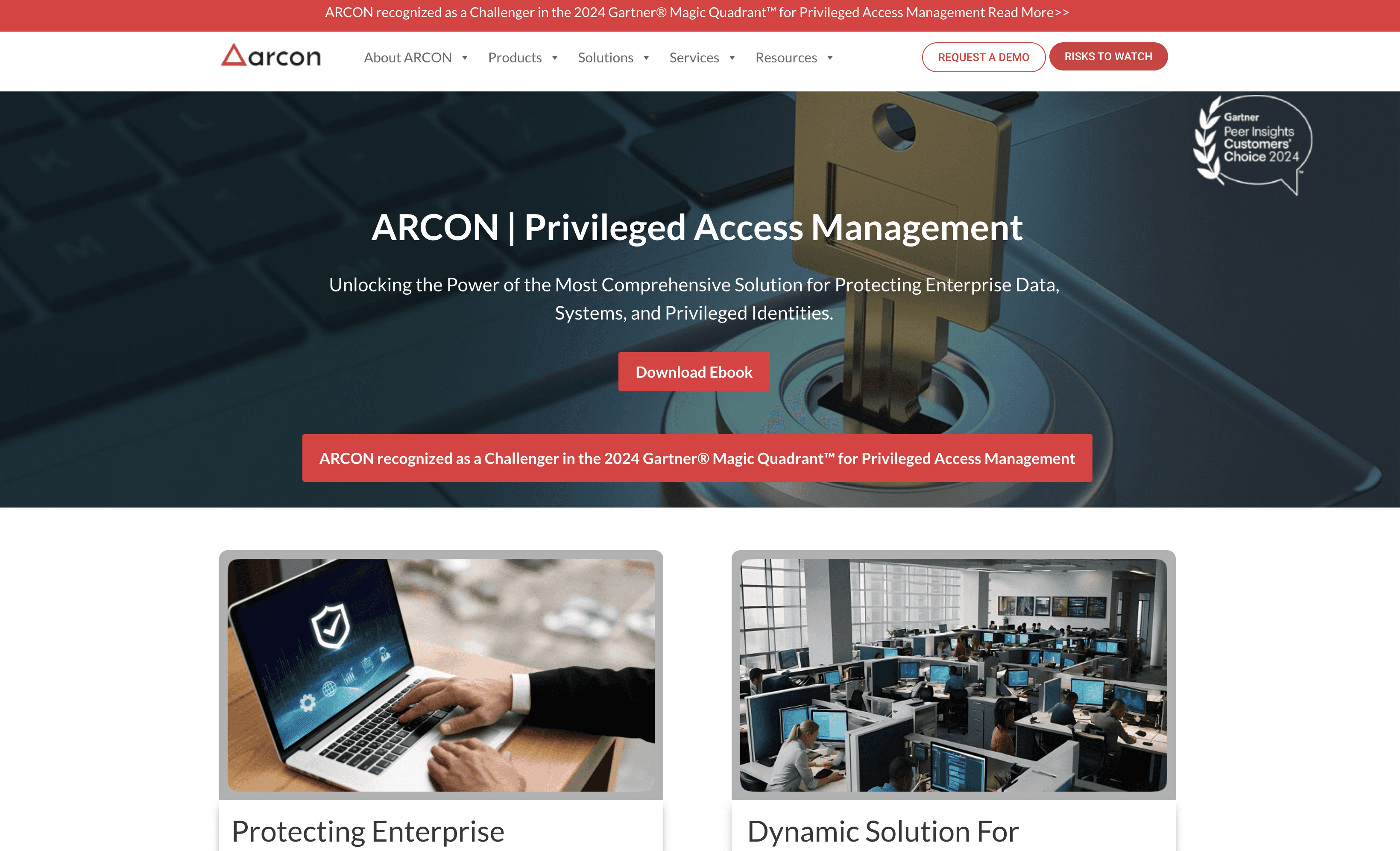
Arcon PAM is a security solution designed to protect enterprise data and manage privileged identities. It offers features like multifactor authentication, access control, and session management, ensuring robust security and compliance. Arcon PAM aims to simplify and secure privileged access across complex IT environments.
Arcon PAM Pricing
Arcon PAM's pricing is not public. Contact their support for more info.
Arcon PAM Reviews
Arcon PAM has an overall rating of 4.3 out of 5 stars based on 23 reviews. Users appreciate its secure access and monitoring features. Check out more of our reviews here!
Pros and Cons of Arcon PAM
Pros:
Comprehensive Solution: ARCON PAM offers extensive technology integrations and scalability, ensuring robust security for high-value systems and data.
Dynamic Capabilities: Features just-in-time access, adaptive authentication, context-aware controls, and extensive integration for DevOps use cases.
Core Features: Includes multifactor authentication, single sign-on, access control, credential management, and session management.
Cons:
Complexity: The comprehensive nature of ARCON PAM requires significant effort and expertise to implement and manage effectively.
Resource Intensive: Initial setup and integration can be resource-intensive and time-consuming, despite high ROI.
Customization Needs: Tailoring the solution to specific requirements may add to complexity and cost.
8. HashiCorp Vault
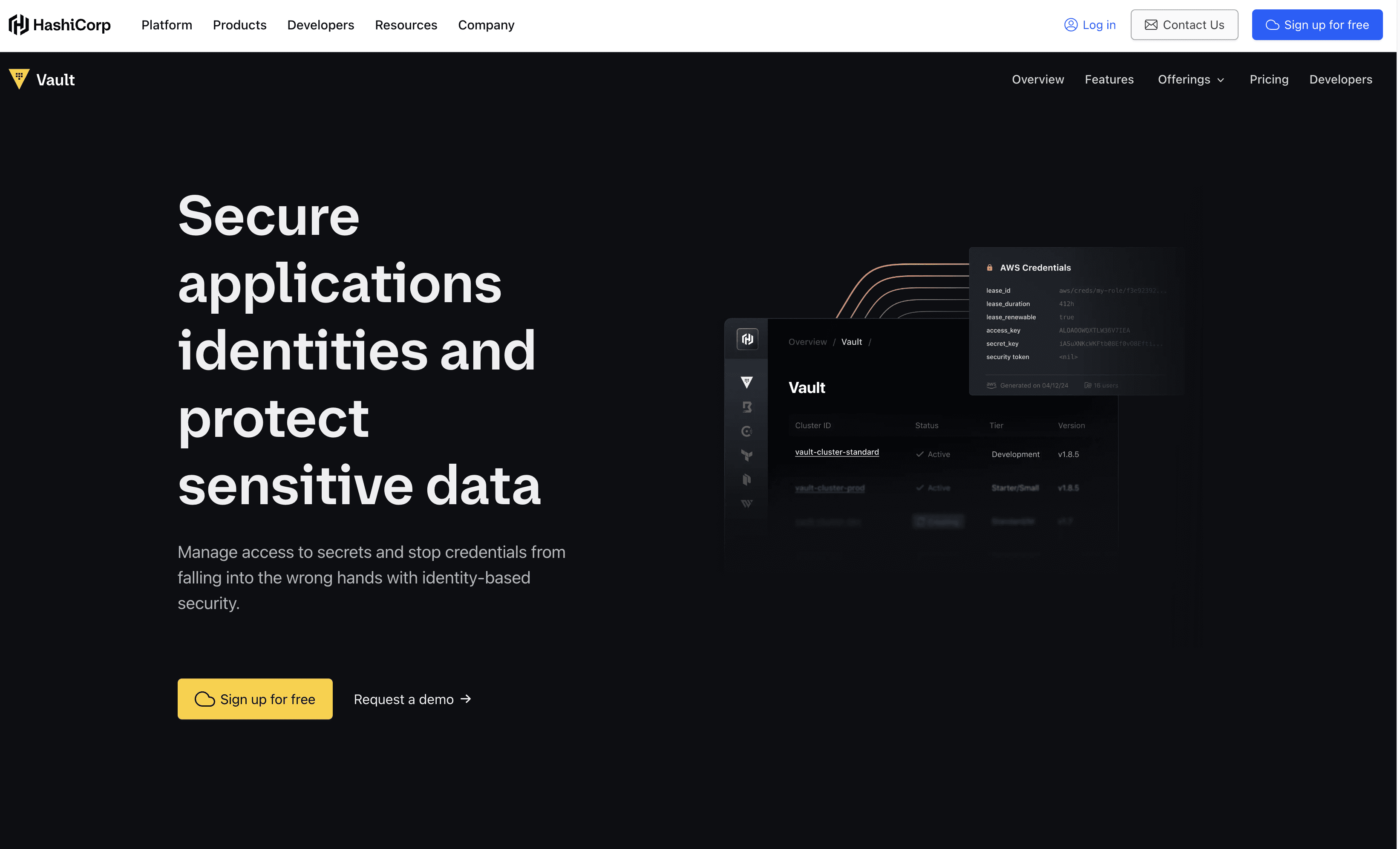
HashiCorp Vault is a security solution designed for identity-based secrets management. It helps organizations securely store, access, and distribute secrets, such as API keys and passwords. With features like automated secret management and API integration, Vault aims to simplify and enhance security for businesses of all sizes.
HashiCorp Vault Pricing
HCP Vault Secrets: Free, Standard starting at $0.50 per secret per month, Plus starting at $0.95 per secret per month
HCP Vault Dedicated: Standard starting at $1.58 per cluster per hour, Plus starting at $1.84 per cluster per hour
Vault Enterprise: Custom
HashiCorp Vault Reviews
HashiCorp Vault has an overall rating of 4.8 out of 5 stars based on 4 reviews. Users appreciate its automation and secret management capabilities. Check out more of our reviews here!
Pros and Cons of HashiCorp Vault
Pros:
Identity-based Security: Automatically authenticates and authorizes access to secrets and sensitive data, ensuring robust protection.
Centralized Secrets Management: Centrally stores, accesses, and distributes secrets programmatically, simplifying secret management.
Automated Certificate Management: Generates, rotates, and revokes certificates on demand, enhancing security and efficiency.
Cons:
Complexity: Implementing and managing Vault requires expertise in identity-based security and secret management.
Initial Setup and Configuration: The initial setup and configuration can be time-consuming and require careful planning.
Integration Challenges: Integrating Vault with existing systems and workflows might present challenges and require additional effort.
9. JumpCloud
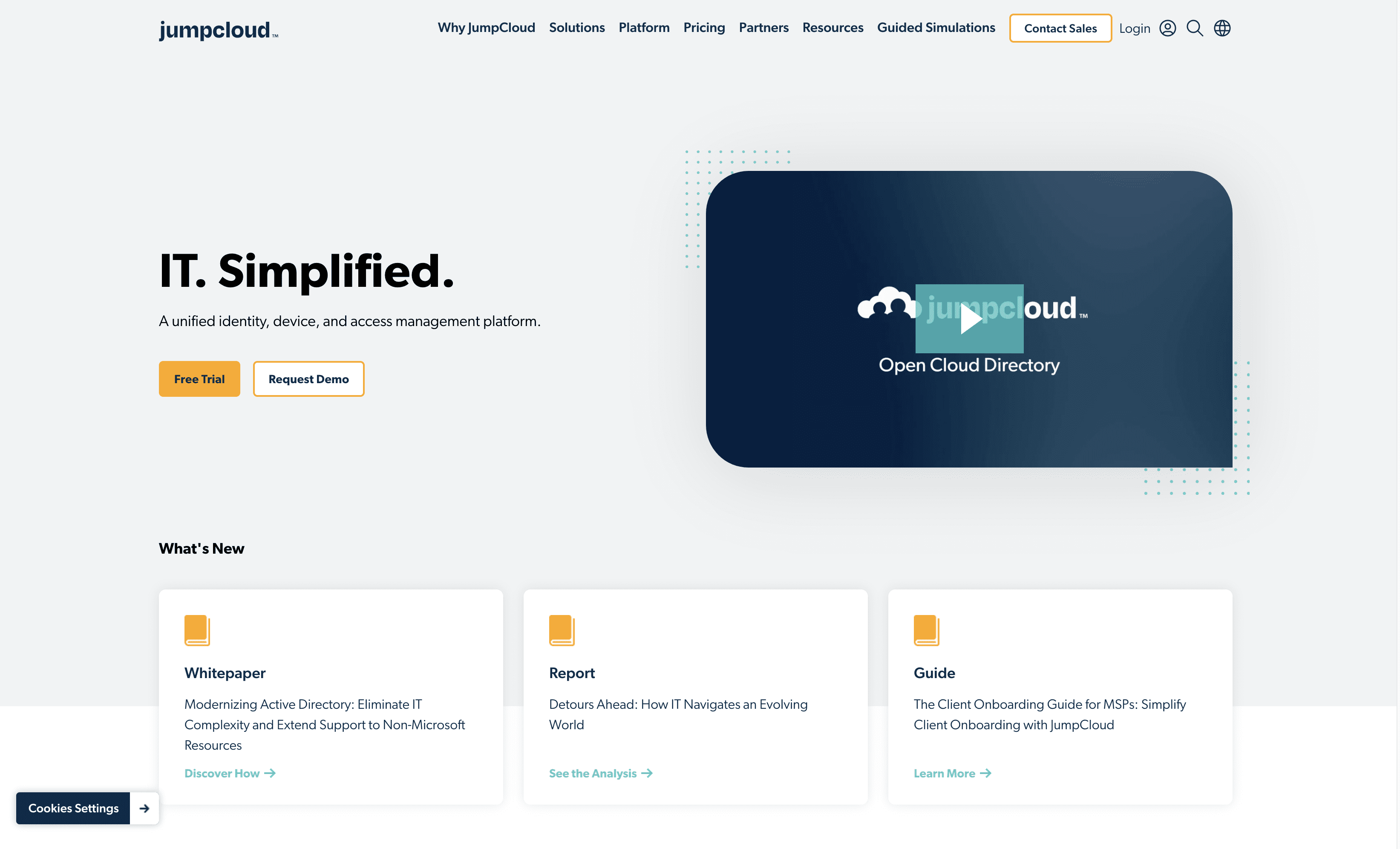
JumpCloud is a unified identity, device, and access management platform designed to simplify IT operations. It provides secure, frictionless access to resources and manages everything in a single unified view. JumpCloud aims to enhance security and efficiency for organizations of all sizes, making IT management straightforward and effective.
JumpCloud Pricing
Device Management: $9/user/month billed annually or $11.00 billed monthly
SSO: $11/user/month billed annually or $13.00 billed monthly
Core Directory: $13/user/month billed annually or $15.00 billed monthly
Platform: $19/user/month billed annually or $22.00 billed monthly
Platform Prime: $24/user/month billed annually or $27.00 billed monthly
JumpCloud Reviews
JumpCloud has an overall rating of 4.5 out of 5 stars based on 2,798 reviews. Users appreciate its ease of device management and excellent customer support. Check out more of our reviews here!
Pros and Cons of JumpCloud
Pros:
Unified Platform: JumpCloud offers a single platform for identity, device, and access management, simplifying IT operations.
Ease of Use: Users appreciate its intuitive interface, making it accessible even for those with limited technical expertise.
Comprehensive Security: Provides robust security features, ensuring protection for all managed devices and identities.
Cons:
Learning Curve: New users may find the platform complex, requiring time and effort to master.
Missing Features: Some users report the absence of certain advanced features, limiting its functionality for specific needs.
Cost Implications: The pricing structure may be prohibitive for smaller organizations, despite the platform's comprehensive capabilities.
10. BeyondTrust
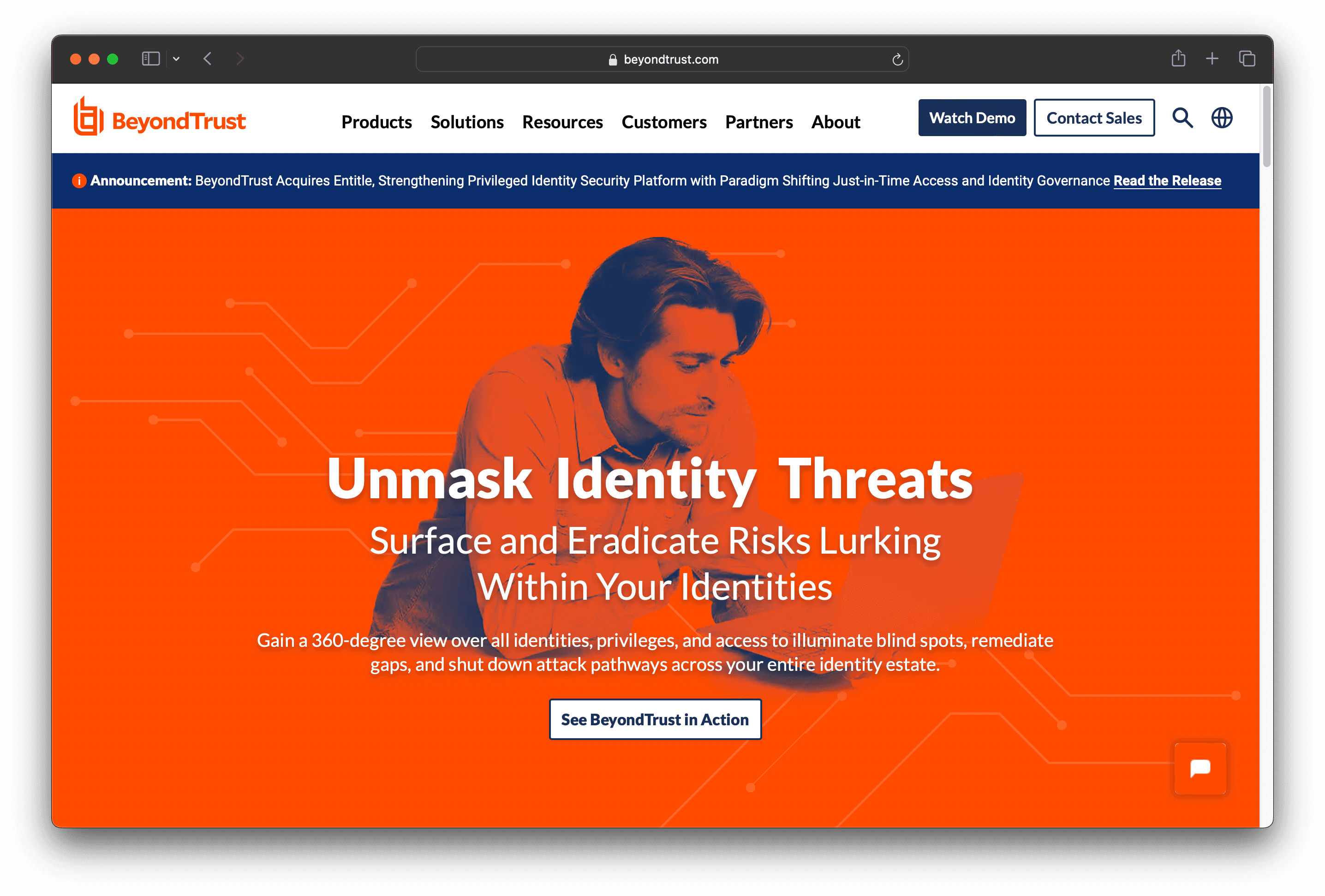
BeyondTrust is a security solution designed to manage and protect privileged accounts and identities. It offers comprehensive visibility, simplified management, and intelligent protection against identity-based threats. BeyondTrust aims to enhance security and operational efficiency for organizations of all sizes, ensuring robust protection and streamlined access management.
BeyondTrust Pricing
BeyondTrust's pricing is not public. Contact their support for more info.
BeyondTrust Reviews
BeyondTrust has an overall rating of 4.7 out of 5 stars based on 340 reviews. Users appreciate its comprehensive security features and user-friendly interface. Check out more of our reviews here!
Pros and Cons of BeyondTrust
Pros:
Holistic Visibility: BeyondTrust provides comprehensive visibility across all identity and access points, ensuring robust security and simplified management.
AI-Powered Insights: Utilizes AI and machine learning to prioritize risks, enhancing overall security and operational efficiency.
Trusted Globally: Over 20,000 customers worldwide rely on BeyondTrust for their identity and access security needs.
Cons:
High Cost: The advanced features and comprehensive security solutions come at a premium, which may be prohibitive for smaller organizations.
Complex Setup: Initial setup and configuration can be complex, requiring specialized knowledge and significant time investment.
Remote Access Issues: Some users report occasional issues with remote access, impacting efficiency and user experience.
Looking to secure your technical infrastructure?
Twingate offers granular access controls and deployment automations to protect your VPC environment. By leveraging Zero Trust security tools, Twingate ensures that private resources and internet traffic remain secure in the modern work landscape. Try Twingate for Free today!
Rapidly implement a modern Zero Trust network that is more secure and maintainable than VPNs.
The Best 10 Alternatives to Foxpass (+ Pricing & Reviews)
Twingate Team
•
Jul 27, 2024

Foxpass provides cloud-based authentication services, including Cloud RADIUS and Cloud LDAP servers, designed to enhance security for IT and engineering teams. While Foxpass offers robust solutions, it may not be suitable for every organization. This article explores the benefits and limitations of using Foxpass for secure access management.

10 Alternatives to Foxpass
1. ManageEngine PAM360

ManageEngine PAM360 is a comprehensive Privileged Access Management solution designed to help enterprises manage and secure privileged accounts. It offers features like session management, privilege elevation, and user behavior analytics, making it a robust tool for enhancing security and compliance in IT environments.
ManageEngine PAM360 Pricing
ManageEngine PAM360's pricing is not public. Contact their support for more info.
ManageEngine PAM360 Reviews
ManageEngine PAM360 has an overall rating of 4.5 out of 5 stars based on 1 review. Users praise its easy integration and management. Check out more of our reviews here!
Pros and Cons of ManageEngine PAM360
Pros:
Comprehensive Feature Set: ManageEngine PAM360 offers a wide range of features, including credential vaulting, privileged account governance, and remote access management.
Integration Ecosystem: Seamlessly integrates with other ManageEngine tools, enhancing overall IT management and security.
User-Friendly Interface: The console's intuitive UI simplifies management and deployment, making it accessible even for less tech-savvy users.
Cons:
Complexity for Small Businesses: The extensive feature set may be overwhelming for smaller organizations with simpler needs.
Learning Curve: Despite its user-friendly interface, the broad functionalities require a learning period for new users.
Cost: Advanced features and compliance readiness might come at a higher cost, which could be a concern for budget-conscious organizations.
2. Delinea

Delinea offers Privileged Access Management and Identity Security solutions designed to secure identities at every interaction. With features like secure credentials, privileged remote access, and real-time threat response, Delinea aims to enhance security and productivity for organizations of all sizes, ensuring ease of deployment and management.
Delinea Pricing
Delinea's pricing is not public. Contact their support for more info.
Delinea Reviews
Delinea has an overall rating of 4.3 out of 5 stars based on 40 reviews. Users appreciate its ease of use and flexibility. Check out more of our reviews here!
Pros and Cons ofDelinea
Pros:
Ease of Use: Users find Delinea intuitive, reducing the learning curve and making it accessible for teams with varying technical expertise.
Customer Support: Highly rated for responsive and effective support, ensuring issues are resolved promptly and efficiently.
Integration Capabilities: Seamlessly integrates with various systems, enhancing overall IT infrastructure without causing disruptions.
Cons:
Cost: The comprehensive features and high reliability come at a premium, which may be prohibitive for smaller organizations.
Navigation Issues: Some users report difficulties with the software's navigation, which can hinder efficiency.
Software Bugs: Occasional bugs have been noted, requiring attention and potentially impacting user experience.
3. Krontech Single Connect

Krontech Single Connect is a Privileged Access Management solution designed to secure privileged accounts, control configurations, and record all activities in data centers or network infrastructures. It aims to prevent breaches, maintain accountability, and increase operational efficiency, making it suitable for enterprises and telecom companies globally.
Krontech Single Connect Pricing
Krontech Single Connect's pricing is not public. Contact their support for more info.
Krontech Single Connect Reviews
Krontech Single Connect has an overall rating of 4.5 out of 5 stars based on 1 review. Users say it is a "must-have for every organization." Check out more of our reviews here!
Pros and Cons of Krontech Single Connect
Pros:
Fast Deployment: Krontech Single Connect is known for its rapid deployment, making it one of the quickest PAM solutions to implement.
High Security: Provides comprehensive security for IT operations and privileged accounts, ensuring robust protection against unauthorized access.
Unified Management: Efficiently manages access, control configurations, and activity recording, streamlining administrative tasks.
Cons:
Complexity: Implementing and managing this comprehensive PAM solution can be complex, requiring specialized knowledge and training.
Cost: High-end security solutions like Krontech Single Connect can be expensive, potentially limiting accessibility for smaller organizations.
Integration: Integrating with existing systems and workflows might pose challenges, necessitating significant effort and resources.
4. Teleport

Teleport is a secure access solution designed to simplify infrastructure management. It offers zero trust access, secretless authentication, and unified policy governance, making it easy for teams to protect and manage their systems. Teleport aims to enhance security and efficiency for organizations of all sizes.
Teleport Pricing
Teleport's pricing is not public. Contact their support for more info.
Teleport Reviews
Teleport has an overall rating of 4.5 out of 5 stars based on 104 reviews. Users appreciate its ease of use and secure access. Check out more of our reviews here!
Pros and Cons of Teleport
Pros:
Secure Access: Teleport provides the most secure way to access and protect infrastructure, ensuring robust security for all users and devices.
Zero Trust Access: Implements zero trust principles, offering secure remote access to applications and workloads without relying on traditional VPNs.
Unified Experience: Breaks access silos by unifying user and machine access to all services, applications, and workloads, simplifying management.
Cons:
Complexity for New Users: The platform may have a learning curve, especially for junior engineers who are not very SSH savvy.
Dependence on Identity Providers: The security and functionality heavily rely on integration with identity providers, which could be a single point of failure if compromised.
Regulatory Hurdles: While Teleport helps meet compliance, navigating these regulatory requirements can still be complex and resource-intensive for organizations.
5. Okta ASA

Okta ASA is a secure access solution designed to simplify infrastructure management. It offers zero trust access, secretless authentication, and unified policy governance, making it easy for teams to protect and manage their systems. Okta ASA aims to enhance security and efficiency for organizations of all sizes.
Okta ASA Pricing
Okta ASA's pricing is not public. Contact their support for more info.
Okta ASA Reviews
Okta ASA has an overall rating of 4.6 out of 5 stars based on 1,200 reviews. Users praise its robust identity management and ease of use. Check out more of our reviews here!
Pros and Cons of Okta ASA
Pros:
Rock-Solid Security: Okta ASA ensures robust security measures, protecting sensitive data and access points effectively.
Streamlined User Experiences: Enhances user experiences, increasing customer sign-ups and satisfaction through seamless access management.
Improved Workforce Productivity: Boosts workforce productivity by simplifying access to necessary tools and applications.
Cons:
Complex Setup: Initial setup and configuration can be complex, requiring specialized knowledge and time.
Cost: The comprehensive features come at a premium, which may be prohibitive for smaller organizations.
Integration Challenges: Integrating Okta ASA with existing systems can pose challenges, necessitating significant effort and resources.
6. Sailpoint

SailPoint is an identity security solution designed to meet the demands of modern enterprises. It offers intelligent, autonomous, and extensible identity management, ensuring secure and efficient operations. SailPoint aims to streamline identity processes, providing a robust foundation for managing and securing all identities and access points.
Sailpoint Pricing
SailPoint's pricing is not public. Contact their support for more info.
Sailpoint Reviews
SailPoint has an overall rating of 4.4 out of 5 stars based on 76 reviews. Users appreciate the automation of access reviews and policy enforcement. Check out more of our reviews here!
Pros and Cons of Sailpoint
Pros:
Intelligent Insights: SailPoint leverages AI and machine learning to provide real-time insights, enhancing identity and access management efficiency.
Autonomous Identity Management: Streamlines identity processes, reducing manual intervention and driving organizational efficiency.
Extensible Integration: Seamlessly integrates with various systems, centralizing access control across the entire IT ecosystem.
Cons:
Complexity: Implementing and managing SailPoint can be complex, requiring significant resources and expertise.
Cost: The advanced features and capabilities come at a premium, potentially limiting accessibility for smaller organizations.
Integration Challenges: Integrating SailPoint with existing systems may pose challenges, necessitating considerable effort and resources.
7. Arcon PAM

Arcon PAM is a security solution designed to protect enterprise data and manage privileged identities. It offers features like multifactor authentication, access control, and session management, ensuring robust security and compliance. Arcon PAM aims to simplify and secure privileged access across complex IT environments.
Arcon PAM Pricing
Arcon PAM's pricing is not public. Contact their support for more info.
Arcon PAM Reviews
Arcon PAM has an overall rating of 4.3 out of 5 stars based on 23 reviews. Users appreciate its secure access and monitoring features. Check out more of our reviews here!
Pros and Cons of Arcon PAM
Pros:
Comprehensive Solution: ARCON PAM offers extensive technology integrations and scalability, ensuring robust security for high-value systems and data.
Dynamic Capabilities: Features just-in-time access, adaptive authentication, context-aware controls, and extensive integration for DevOps use cases.
Core Features: Includes multifactor authentication, single sign-on, access control, credential management, and session management.
Cons:
Complexity: The comprehensive nature of ARCON PAM requires significant effort and expertise to implement and manage effectively.
Resource Intensive: Initial setup and integration can be resource-intensive and time-consuming, despite high ROI.
Customization Needs: Tailoring the solution to specific requirements may add to complexity and cost.
8. HashiCorp Vault

HashiCorp Vault is a security solution designed for identity-based secrets management. It helps organizations securely store, access, and distribute secrets, such as API keys and passwords. With features like automated secret management and API integration, Vault aims to simplify and enhance security for businesses of all sizes.
HashiCorp Vault Pricing
HCP Vault Secrets: Free, Standard starting at $0.50 per secret per month, Plus starting at $0.95 per secret per month
HCP Vault Dedicated: Standard starting at $1.58 per cluster per hour, Plus starting at $1.84 per cluster per hour
Vault Enterprise: Custom
HashiCorp Vault Reviews
HashiCorp Vault has an overall rating of 4.8 out of 5 stars based on 4 reviews. Users appreciate its automation and secret management capabilities. Check out more of our reviews here!
Pros and Cons of HashiCorp Vault
Pros:
Identity-based Security: Automatically authenticates and authorizes access to secrets and sensitive data, ensuring robust protection.
Centralized Secrets Management: Centrally stores, accesses, and distributes secrets programmatically, simplifying secret management.
Automated Certificate Management: Generates, rotates, and revokes certificates on demand, enhancing security and efficiency.
Cons:
Complexity: Implementing and managing Vault requires expertise in identity-based security and secret management.
Initial Setup and Configuration: The initial setup and configuration can be time-consuming and require careful planning.
Integration Challenges: Integrating Vault with existing systems and workflows might present challenges and require additional effort.
9. JumpCloud

JumpCloud is a unified identity, device, and access management platform designed to simplify IT operations. It provides secure, frictionless access to resources and manages everything in a single unified view. JumpCloud aims to enhance security and efficiency for organizations of all sizes, making IT management straightforward and effective.
JumpCloud Pricing
Device Management: $9/user/month billed annually or $11.00 billed monthly
SSO: $11/user/month billed annually or $13.00 billed monthly
Core Directory: $13/user/month billed annually or $15.00 billed monthly
Platform: $19/user/month billed annually or $22.00 billed monthly
Platform Prime: $24/user/month billed annually or $27.00 billed monthly
JumpCloud Reviews
JumpCloud has an overall rating of 4.5 out of 5 stars based on 2,798 reviews. Users appreciate its ease of device management and excellent customer support. Check out more of our reviews here!
Pros and Cons of JumpCloud
Pros:
Unified Platform: JumpCloud offers a single platform for identity, device, and access management, simplifying IT operations.
Ease of Use: Users appreciate its intuitive interface, making it accessible even for those with limited technical expertise.
Comprehensive Security: Provides robust security features, ensuring protection for all managed devices and identities.
Cons:
Learning Curve: New users may find the platform complex, requiring time and effort to master.
Missing Features: Some users report the absence of certain advanced features, limiting its functionality for specific needs.
Cost Implications: The pricing structure may be prohibitive for smaller organizations, despite the platform's comprehensive capabilities.
10. BeyondTrust

BeyondTrust is a security solution designed to manage and protect privileged accounts and identities. It offers comprehensive visibility, simplified management, and intelligent protection against identity-based threats. BeyondTrust aims to enhance security and operational efficiency for organizations of all sizes, ensuring robust protection and streamlined access management.
BeyondTrust Pricing
BeyondTrust's pricing is not public. Contact their support for more info.
BeyondTrust Reviews
BeyondTrust has an overall rating of 4.7 out of 5 stars based on 340 reviews. Users appreciate its comprehensive security features and user-friendly interface. Check out more of our reviews here!
Pros and Cons of BeyondTrust
Pros:
Holistic Visibility: BeyondTrust provides comprehensive visibility across all identity and access points, ensuring robust security and simplified management.
AI-Powered Insights: Utilizes AI and machine learning to prioritize risks, enhancing overall security and operational efficiency.
Trusted Globally: Over 20,000 customers worldwide rely on BeyondTrust for their identity and access security needs.
Cons:
High Cost: The advanced features and comprehensive security solutions come at a premium, which may be prohibitive for smaller organizations.
Complex Setup: Initial setup and configuration can be complex, requiring specialized knowledge and significant time investment.
Remote Access Issues: Some users report occasional issues with remote access, impacting efficiency and user experience.
Looking to secure your technical infrastructure?
Twingate offers granular access controls and deployment automations to protect your VPC environment. By leveraging Zero Trust security tools, Twingate ensures that private resources and internet traffic remain secure in the modern work landscape. Try Twingate for Free today!
Rapidly implement a modern Zero Trust network that is more secure and maintainable than VPNs.
The Best 10 Alternatives to Foxpass (+ Pricing & Reviews)
Twingate Team
•
Jul 27, 2024

Foxpass provides cloud-based authentication services, including Cloud RADIUS and Cloud LDAP servers, designed to enhance security for IT and engineering teams. While Foxpass offers robust solutions, it may not be suitable for every organization. This article explores the benefits and limitations of using Foxpass for secure access management.

10 Alternatives to Foxpass
1. ManageEngine PAM360

ManageEngine PAM360 is a comprehensive Privileged Access Management solution designed to help enterprises manage and secure privileged accounts. It offers features like session management, privilege elevation, and user behavior analytics, making it a robust tool for enhancing security and compliance in IT environments.
ManageEngine PAM360 Pricing
ManageEngine PAM360's pricing is not public. Contact their support for more info.
ManageEngine PAM360 Reviews
ManageEngine PAM360 has an overall rating of 4.5 out of 5 stars based on 1 review. Users praise its easy integration and management. Check out more of our reviews here!
Pros and Cons of ManageEngine PAM360
Pros:
Comprehensive Feature Set: ManageEngine PAM360 offers a wide range of features, including credential vaulting, privileged account governance, and remote access management.
Integration Ecosystem: Seamlessly integrates with other ManageEngine tools, enhancing overall IT management and security.
User-Friendly Interface: The console's intuitive UI simplifies management and deployment, making it accessible even for less tech-savvy users.
Cons:
Complexity for Small Businesses: The extensive feature set may be overwhelming for smaller organizations with simpler needs.
Learning Curve: Despite its user-friendly interface, the broad functionalities require a learning period for new users.
Cost: Advanced features and compliance readiness might come at a higher cost, which could be a concern for budget-conscious organizations.
2. Delinea

Delinea offers Privileged Access Management and Identity Security solutions designed to secure identities at every interaction. With features like secure credentials, privileged remote access, and real-time threat response, Delinea aims to enhance security and productivity for organizations of all sizes, ensuring ease of deployment and management.
Delinea Pricing
Delinea's pricing is not public. Contact their support for more info.
Delinea Reviews
Delinea has an overall rating of 4.3 out of 5 stars based on 40 reviews. Users appreciate its ease of use and flexibility. Check out more of our reviews here!
Pros and Cons ofDelinea
Pros:
Ease of Use: Users find Delinea intuitive, reducing the learning curve and making it accessible for teams with varying technical expertise.
Customer Support: Highly rated for responsive and effective support, ensuring issues are resolved promptly and efficiently.
Integration Capabilities: Seamlessly integrates with various systems, enhancing overall IT infrastructure without causing disruptions.
Cons:
Cost: The comprehensive features and high reliability come at a premium, which may be prohibitive for smaller organizations.
Navigation Issues: Some users report difficulties with the software's navigation, which can hinder efficiency.
Software Bugs: Occasional bugs have been noted, requiring attention and potentially impacting user experience.
3. Krontech Single Connect

Krontech Single Connect is a Privileged Access Management solution designed to secure privileged accounts, control configurations, and record all activities in data centers or network infrastructures. It aims to prevent breaches, maintain accountability, and increase operational efficiency, making it suitable for enterprises and telecom companies globally.
Krontech Single Connect Pricing
Krontech Single Connect's pricing is not public. Contact their support for more info.
Krontech Single Connect Reviews
Krontech Single Connect has an overall rating of 4.5 out of 5 stars based on 1 review. Users say it is a "must-have for every organization." Check out more of our reviews here!
Pros and Cons of Krontech Single Connect
Pros:
Fast Deployment: Krontech Single Connect is known for its rapid deployment, making it one of the quickest PAM solutions to implement.
High Security: Provides comprehensive security for IT operations and privileged accounts, ensuring robust protection against unauthorized access.
Unified Management: Efficiently manages access, control configurations, and activity recording, streamlining administrative tasks.
Cons:
Complexity: Implementing and managing this comprehensive PAM solution can be complex, requiring specialized knowledge and training.
Cost: High-end security solutions like Krontech Single Connect can be expensive, potentially limiting accessibility for smaller organizations.
Integration: Integrating with existing systems and workflows might pose challenges, necessitating significant effort and resources.
4. Teleport

Teleport is a secure access solution designed to simplify infrastructure management. It offers zero trust access, secretless authentication, and unified policy governance, making it easy for teams to protect and manage their systems. Teleport aims to enhance security and efficiency for organizations of all sizes.
Teleport Pricing
Teleport's pricing is not public. Contact their support for more info.
Teleport Reviews
Teleport has an overall rating of 4.5 out of 5 stars based on 104 reviews. Users appreciate its ease of use and secure access. Check out more of our reviews here!
Pros and Cons of Teleport
Pros:
Secure Access: Teleport provides the most secure way to access and protect infrastructure, ensuring robust security for all users and devices.
Zero Trust Access: Implements zero trust principles, offering secure remote access to applications and workloads without relying on traditional VPNs.
Unified Experience: Breaks access silos by unifying user and machine access to all services, applications, and workloads, simplifying management.
Cons:
Complexity for New Users: The platform may have a learning curve, especially for junior engineers who are not very SSH savvy.
Dependence on Identity Providers: The security and functionality heavily rely on integration with identity providers, which could be a single point of failure if compromised.
Regulatory Hurdles: While Teleport helps meet compliance, navigating these regulatory requirements can still be complex and resource-intensive for organizations.
5. Okta ASA

Okta ASA is a secure access solution designed to simplify infrastructure management. It offers zero trust access, secretless authentication, and unified policy governance, making it easy for teams to protect and manage their systems. Okta ASA aims to enhance security and efficiency for organizations of all sizes.
Okta ASA Pricing
Okta ASA's pricing is not public. Contact their support for more info.
Okta ASA Reviews
Okta ASA has an overall rating of 4.6 out of 5 stars based on 1,200 reviews. Users praise its robust identity management and ease of use. Check out more of our reviews here!
Pros and Cons of Okta ASA
Pros:
Rock-Solid Security: Okta ASA ensures robust security measures, protecting sensitive data and access points effectively.
Streamlined User Experiences: Enhances user experiences, increasing customer sign-ups and satisfaction through seamless access management.
Improved Workforce Productivity: Boosts workforce productivity by simplifying access to necessary tools and applications.
Cons:
Complex Setup: Initial setup and configuration can be complex, requiring specialized knowledge and time.
Cost: The comprehensive features come at a premium, which may be prohibitive for smaller organizations.
Integration Challenges: Integrating Okta ASA with existing systems can pose challenges, necessitating significant effort and resources.
6. Sailpoint

SailPoint is an identity security solution designed to meet the demands of modern enterprises. It offers intelligent, autonomous, and extensible identity management, ensuring secure and efficient operations. SailPoint aims to streamline identity processes, providing a robust foundation for managing and securing all identities and access points.
Sailpoint Pricing
SailPoint's pricing is not public. Contact their support for more info.
Sailpoint Reviews
SailPoint has an overall rating of 4.4 out of 5 stars based on 76 reviews. Users appreciate the automation of access reviews and policy enforcement. Check out more of our reviews here!
Pros and Cons of Sailpoint
Pros:
Intelligent Insights: SailPoint leverages AI and machine learning to provide real-time insights, enhancing identity and access management efficiency.
Autonomous Identity Management: Streamlines identity processes, reducing manual intervention and driving organizational efficiency.
Extensible Integration: Seamlessly integrates with various systems, centralizing access control across the entire IT ecosystem.
Cons:
Complexity: Implementing and managing SailPoint can be complex, requiring significant resources and expertise.
Cost: The advanced features and capabilities come at a premium, potentially limiting accessibility for smaller organizations.
Integration Challenges: Integrating SailPoint with existing systems may pose challenges, necessitating considerable effort and resources.
7. Arcon PAM

Arcon PAM is a security solution designed to protect enterprise data and manage privileged identities. It offers features like multifactor authentication, access control, and session management, ensuring robust security and compliance. Arcon PAM aims to simplify and secure privileged access across complex IT environments.
Arcon PAM Pricing
Arcon PAM's pricing is not public. Contact their support for more info.
Arcon PAM Reviews
Arcon PAM has an overall rating of 4.3 out of 5 stars based on 23 reviews. Users appreciate its secure access and monitoring features. Check out more of our reviews here!
Pros and Cons of Arcon PAM
Pros:
Comprehensive Solution: ARCON PAM offers extensive technology integrations and scalability, ensuring robust security for high-value systems and data.
Dynamic Capabilities: Features just-in-time access, adaptive authentication, context-aware controls, and extensive integration for DevOps use cases.
Core Features: Includes multifactor authentication, single sign-on, access control, credential management, and session management.
Cons:
Complexity: The comprehensive nature of ARCON PAM requires significant effort and expertise to implement and manage effectively.
Resource Intensive: Initial setup and integration can be resource-intensive and time-consuming, despite high ROI.
Customization Needs: Tailoring the solution to specific requirements may add to complexity and cost.
8. HashiCorp Vault

HashiCorp Vault is a security solution designed for identity-based secrets management. It helps organizations securely store, access, and distribute secrets, such as API keys and passwords. With features like automated secret management and API integration, Vault aims to simplify and enhance security for businesses of all sizes.
HashiCorp Vault Pricing
HCP Vault Secrets: Free, Standard starting at $0.50 per secret per month, Plus starting at $0.95 per secret per month
HCP Vault Dedicated: Standard starting at $1.58 per cluster per hour, Plus starting at $1.84 per cluster per hour
Vault Enterprise: Custom
HashiCorp Vault Reviews
HashiCorp Vault has an overall rating of 4.8 out of 5 stars based on 4 reviews. Users appreciate its automation and secret management capabilities. Check out more of our reviews here!
Pros and Cons of HashiCorp Vault
Pros:
Identity-based Security: Automatically authenticates and authorizes access to secrets and sensitive data, ensuring robust protection.
Centralized Secrets Management: Centrally stores, accesses, and distributes secrets programmatically, simplifying secret management.
Automated Certificate Management: Generates, rotates, and revokes certificates on demand, enhancing security and efficiency.
Cons:
Complexity: Implementing and managing Vault requires expertise in identity-based security and secret management.
Initial Setup and Configuration: The initial setup and configuration can be time-consuming and require careful planning.
Integration Challenges: Integrating Vault with existing systems and workflows might present challenges and require additional effort.
9. JumpCloud

JumpCloud is a unified identity, device, and access management platform designed to simplify IT operations. It provides secure, frictionless access to resources and manages everything in a single unified view. JumpCloud aims to enhance security and efficiency for organizations of all sizes, making IT management straightforward and effective.
JumpCloud Pricing
Device Management: $9/user/month billed annually or $11.00 billed monthly
SSO: $11/user/month billed annually or $13.00 billed monthly
Core Directory: $13/user/month billed annually or $15.00 billed monthly
Platform: $19/user/month billed annually or $22.00 billed monthly
Platform Prime: $24/user/month billed annually or $27.00 billed monthly
JumpCloud Reviews
JumpCloud has an overall rating of 4.5 out of 5 stars based on 2,798 reviews. Users appreciate its ease of device management and excellent customer support. Check out more of our reviews here!
Pros and Cons of JumpCloud
Pros:
Unified Platform: JumpCloud offers a single platform for identity, device, and access management, simplifying IT operations.
Ease of Use: Users appreciate its intuitive interface, making it accessible even for those with limited technical expertise.
Comprehensive Security: Provides robust security features, ensuring protection for all managed devices and identities.
Cons:
Learning Curve: New users may find the platform complex, requiring time and effort to master.
Missing Features: Some users report the absence of certain advanced features, limiting its functionality for specific needs.
Cost Implications: The pricing structure may be prohibitive for smaller organizations, despite the platform's comprehensive capabilities.
10. BeyondTrust

BeyondTrust is a security solution designed to manage and protect privileged accounts and identities. It offers comprehensive visibility, simplified management, and intelligent protection against identity-based threats. BeyondTrust aims to enhance security and operational efficiency for organizations of all sizes, ensuring robust protection and streamlined access management.
BeyondTrust Pricing
BeyondTrust's pricing is not public. Contact their support for more info.
BeyondTrust Reviews
BeyondTrust has an overall rating of 4.7 out of 5 stars based on 340 reviews. Users appreciate its comprehensive security features and user-friendly interface. Check out more of our reviews here!
Pros and Cons of BeyondTrust
Pros:
Holistic Visibility: BeyondTrust provides comprehensive visibility across all identity and access points, ensuring robust security and simplified management.
AI-Powered Insights: Utilizes AI and machine learning to prioritize risks, enhancing overall security and operational efficiency.
Trusted Globally: Over 20,000 customers worldwide rely on BeyondTrust for their identity and access security needs.
Cons:
High Cost: The advanced features and comprehensive security solutions come at a premium, which may be prohibitive for smaller organizations.
Complex Setup: Initial setup and configuration can be complex, requiring specialized knowledge and significant time investment.
Remote Access Issues: Some users report occasional issues with remote access, impacting efficiency and user experience.
Looking to secure your technical infrastructure?
Twingate offers granular access controls and deployment automations to protect your VPC environment. By leveraging Zero Trust security tools, Twingate ensures that private resources and internet traffic remain secure in the modern work landscape. Try Twingate for Free today!
Solutions
Solutions
The VPN replacement your workforce will love.
Solutions